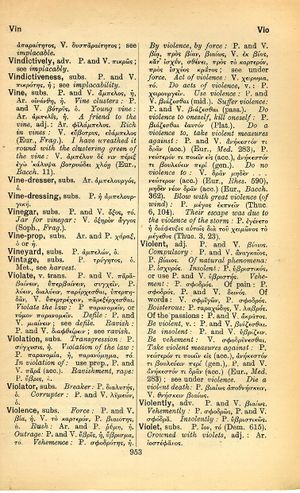violence
αὐτάρκης ἔσῃ, ἂν μάθῃς τί τὸ καλὸν κἀγαθόν ἐστι → you will be contented with your lot if you learn what the honourable and good is
English > Greek (Woodhouse)
substantive
force: P. and V. βία, ἡ. V. τὸ καρτερόν, P. βιαιότης, ἡ.
[[outrage P.]] V. ὕβρις, ἡ, ὕβρισμα, τό.
by violence, by force: P. and V. βίᾳ, πρὸς βίαν, βιαίως, V. ἐκ βίας, κατ' ἰσχύν, σθένει, πρὸς τὸ καρτερόν, πρὸς ἰσχύος κράτος; see under force.
act of violence: V. χείρωμα, τό.
do acts of violence, v.: P. χειρουργεῖν. Use
violence: P. and V. βιάζεσθαι; (mid.).
suffer violence: P. and V. βιάζεσθαι; (pass.).
do violence to oneself, kill oneself: P. βιάζεσθαι ἑαυτόν (Plato).
do a violence to, take violent measures against: P. and V. ἀνήκεστόν τι δρᾶν (acc.) (Eur., Med. 283), P. νεώτερόν τι ποιεῖν εἰς (acc.), ἀνήκεστόν τι βουλεύειν περί (gen.).
do no violence to: V. δρᾶν μηδὲν… νεώτερον (acc.) (Eur., Rhesus 590), μηδὲν νέον δρᾶν (acc.) (Eur., Bacchae 362).
blow with great violence (of wind): P. μέγας ἐκπνεῖν (Thuc. 6, 104).
their escape was due to the violence of the storm: P. ἐγένετο ἡ διάφευξις αὐτοῖς διὰ τοῦ χειμῶνος τὸ μέγεθος (Thuc. 3, 23).

